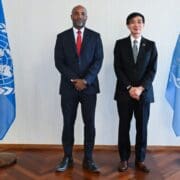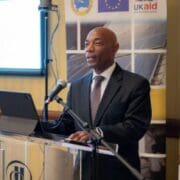Black Immigrant Daily News
The upsurge in violence causing socio-economic upheaval in Haiti has serious implications for regional stability and warrants urgent attention, urges Premier of Nevis, Mark Brantley.
“I think the issue of Haiti is one that is not attracting sufficient attention from those of us who find ourselves in leadership positions across the region, and indeed across the world. By all accounts the situation in Haiti has deteriorated badly and the suggestion now is that armed criminal gangs are in control of most of Haiti. The government there has lost much of the control of the territory and the institutions naturally will suffer as a result.
“I recognize that at a recent CARICOM meeting in The Bahamas that Haiti did occupy some time on the agenda and I welcome that, and I say that as the Premier of Nevis and as a Federal representative on the Opposition benches that it is important that we as a region pay close critical and urgent attention to the situation in Haiti,” he said at a press conference on Feb. 28.
Just recently 13 Haiti nationals, including three juveniles, were intercepted by authorities in the waters off Nevis. According to Premier Brantley, this occurrence, the second such illegal entry of Haitians into Nevis, is likely an indication of what should be expected if the situation in Haiti is allowed to pervade.
“The persons who showed up here in Nevis are in my humble view a speck- they’re not even the tip of the iceberg. They are just a drop of water on the top of that iceberg of what could become a flood. And as I indicated in another forum, if even ten percent of the population of Haiti were to seek to flee Haiti because of the deteriorating security circumstances there, then we in our region can potentially see well over one million persons moving in the region.
“I shudder to think how a small island like Nevis or small country like St. Kitts and Nevis- a microstate- would be able to cope with even an influx of say 10,000 people. Think about it- our schools, our health sector, our housing sector, our social services. We have had for example, since this boat came ashore here in Nevis, 13 or so brothers and sisters from Haiti being housed at the community centre in Hanleys Road, and we’ve had of course to feed them and to take care of them. The costs keeps escalating daily; and that’s only 13 people, and so I feel that there is a clear and present danger that if the situation in Haiti is not addressed and Haitians, like people the world over decide to move…we’ve seen it everywhere in the world where there’s crisis, people seek safety, people flee, and if that happens, we have the potential for millions of persons to be seeking to flee Haiti to find comfort and support someplace else,” he said.
An attorney on St. Kitts sought and obtained an injunction to prevent the government from repatriating the illegal immigrants that were detained in Nevis and is seeking asylum for them. The Haitians will be moved to St. Kitts and maintained there until the court hearing, which is scheduled for March 6.
Premier Brantley, who served for seven years as Foreign Affairs Minister for St. Kitts and Nevis, says while he understands the sentimentality surrounding the issue, as a matter of practicality, the small island states of CARICOM simply do not have the resources to handle a large influx of persons in a short period of time.
“I hear the argument being made and I understand the sentiment behind that argument that these are our brothers and sisters, these are Caribbean people, in large measure these are black people like us, and we therefore should welcome them with open arms; but we live in a community where month after month I come here and the press challenges me, as they should, as to whether we are doing enough, whether the resources we’ve allocated to this or that are adequate, and we are in a constant situation in these islands of not having enough resources to provide for who we have here already.
“And so the question that comes is whether or not, with even a moderate number of individuals flowing into St. Kitts and Nevis, can we manage it, or will it lead to instability and difficulty. These are not in some cases people who are coming with money to invest, to buy homes, and to set themselves up. These are individuals who are fleeing a bad situation and are therefore coming looking for an opportunity. So do we have the jobs to provide, do we having the housing to house, do we have the space in our schools to send them to school, do we have the capacity to deal with any health issues that would arise with a large influx of individuals at one time, and will our society be open enough to say that this is something that we ought to do. I think these are all very important questions, because if we were to see a large influx of individuals overnight, it means that we could run the risk of seeing some instability occurring right here…It doesn’t give me any comfort to say these things, I just feel that these are important issues,” he cited, pointing out the obvious communication barrier as the official language of the 11.8 million residents of Haiti is French.
The Premier stated he would welcome a national debate in St. Kitts and Nevis on the issue as a matter of critical importance.
Donate At Caribbean News Service, we do not charge for our content and we want to keep it that way. We are seeking support from individuals and organisations so we can continue our work & develop CNS further.
NewsAmericasNow.com







